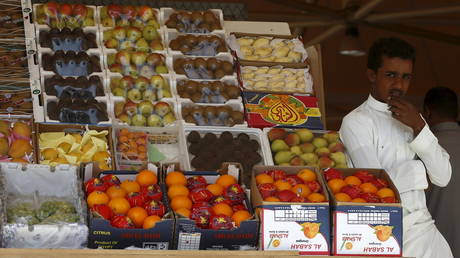
Imports of Lebanese produce to Saudi Arabia will be banned indefinitely starting from Sunday as they’re being used to smuggle drugs, Riyadh has announced, delivering another blow to Lebanon amid its harsh financial crisis.
Saudi authorities have recently witnessed “increased drug smuggling activity targeting the Kingdom” via Lebanese products, “especially in vegetables and fruits consignments,” the country’s Interior Ministry said on Friday, as cited by the official SPA news agency.
The ban is being introduced to stop “systematic smuggling operations” and protect Saudi citizens from forbidden substances, the ministry added.
Riyadh only moved forward with the restrictions after “numerous attempts” to urge Beirut to deal with the drug trafficking problem were met with inaction, it claimed.
The ban will remain in place until Lebanese authorities “provide sufficient and reliable guarantees” that they will take the necessary measures aimed at stopping smuggling to Saudi Arabia. The Interior Ministry will also keep monitoring other types of cargo arriving from Lebanon to decide if they should be restricted too.
After the announcement, Beirut swiftly expressed its readiness to work with Riyadh on the issue, with Lebanon’s caretaker interior minister, Mohamed Fahmy, calling for “more cooperation” between the security services of the two countries.
Lebanon “has been exerting tremendous efforts combating drug smuggling,” but despite “meticulous” efforts, the perpetrators still manage to succeed sometimes, Fahmy told Reuters.
Caretaker Agriculture Minister Abbas Mortada complained that the Saudi ban was “very serious,” not only because of the financial losses on the Lebanese side, but also because it could prompt other Gulf States to follow suit.
The fruit and vegetable exports from Lebanon to Saudi Arabia were worth $24 million a year, according to Mortada, a significant sum for the country gripped by financial crises.
Beirut’s foreign reserves have been depleted, while the Lebanese pound has lost around 90% of its value since the economic problems escalated in late 2019.
The situation was further compounded by the Covid-19 pandemic and a major explosion of ammonium nitrate stored at Beirut port last August, killing 215 people, injuring 7,500 others, and inflicting massive damage on the capital.
The inability of Lebanese politicians to agree on the formation of a new government has also hampered the state from receiving foreign aid.
Think your friends would be interested? Share this story!




